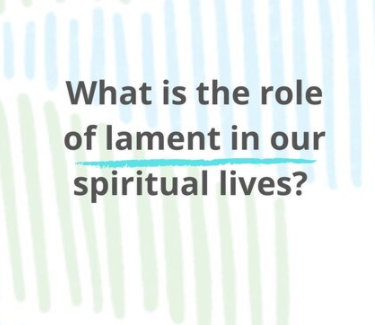Lamentation as a Spiritual Practice
I just started Abby Norman’s new book, You Can Talk to God Like That. This is a book for our times!
When I was researching and writing Reclaiming Rest last year, I became intrigued with lamentation as a spiritual practice. One of the chapters in Abby’s book is entitled, "Do Good Christians Have Bad Feelings?" Of COURSE! So, what do we do with these feelings - including our anger, disappointment, frustration, impatience, and even horror? Lament is spiritually appropriate in these times. Abby writes, "Being angry with God is far from the act of a failed person of faith; it is a vital, necessary part of a healthy relationship with God. It is an act of worship and that act of worship is called lament."
She goes on to point out that lament "takes up a surprising amount of space in the Old Testament." For example, almost 40% of the Psalms are comprised of lamentation.
In my own writing about rest and Sabbath-keeping, I explore how lamentation is an appropriate response to the fact that not all have the ability to rest. This takes many forms: Not all can afford to rest. Not all are ALLOWED to rest.
Most painfully, Black and Brown people are even killed while resting. After the murders of Ahmaud Arbery and Breonna Taylor in 2020, Wesley Morris wrote a column in The New York Times, and asked why white Americans still won’t allow Black people to "run for leisure and sleep for rest.”
Ongoing racial injustice and violence are creating individual and collective trauma, especially among people of color. As we grapple with how to respond individually and collectively and how to honor our emotions throughout the process, we must recognize that rest as a spiritual practice is critical. Rest is life-giving and life-saving. But more than this, rest is a gift and mandate from God, and it is part of a broader theology of justice.
So how do we approach Sabbath-keeping as a spiritual practice knowing that it is a privilege that many cannot afford and many are systematically denied? The appropriate response is not to abandon Sabbath-keeping. Rather, we must concurrently adopt practices of confession, repentance, and—importantly — lamentation as part of a faithful approach to reclaiming rest.

